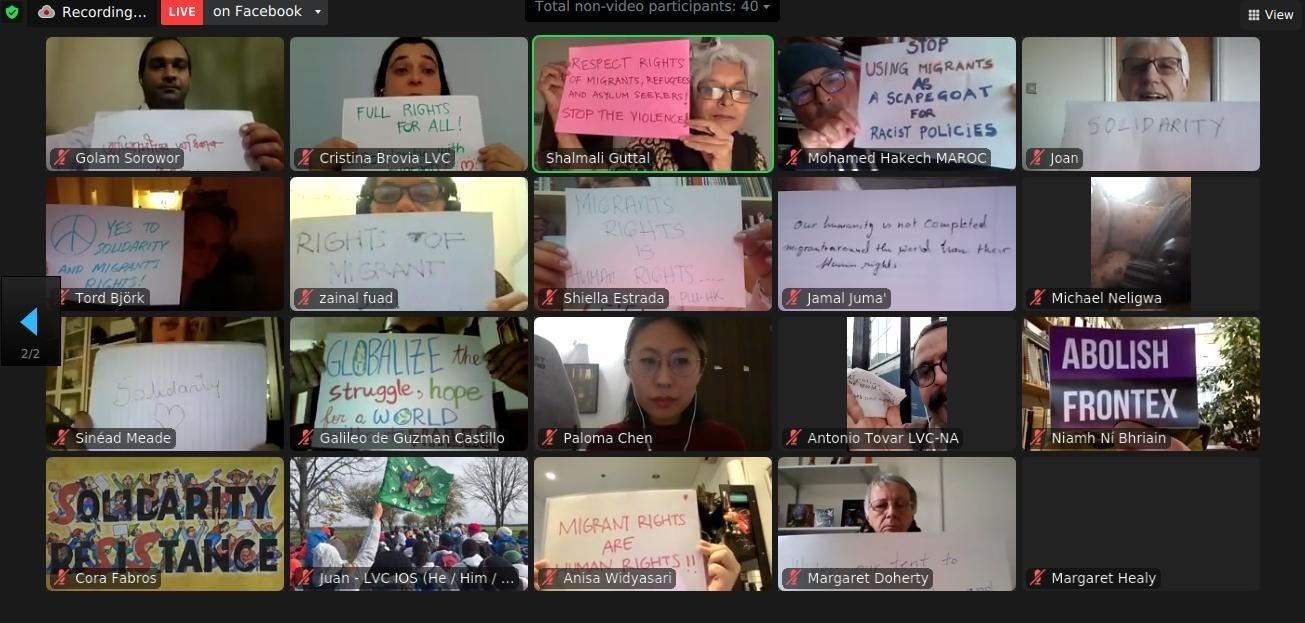A Global Solidarity Pact for migrants and refugee people

On December 18, 2021, on the occasion of the International Day of Migrants, La Via Campesina (LVC) together with allied international organizations held a Virtual Forum on “The Rights of Migrants are Human Rights”. This was a space for meeting and reflection that brought together activists from different parts of the world currently working to demand respect for the rights and lives of migrants and refugee people.
The event had the strong purpose of consolidating a Global Solidarity Pact as a popular response to the Pact on Migration and Asylum, recently presented by the European Union and to the UN Global Compact for Safe, Orderly and Regular Migration. This pact has been opposed by social movements for criminalizing the free transit of people and for representing a step backwards with respect to human rights and the protection of migrants and their families, as established in previous international conventions approved by the United Nations and other institutions such as the International Labor Organization (ILO).
“Our proposal was born in Morocco, three years ago, when together with other movements we decided to radically reject the UN Global Compact for Safe, Orderly and Regular Migration, because it did not represent a change in anti-migration policies and did not do anything against the inhumane treatment of migrants and asylum seekers”, said Golam Sorowor (LVC) from Bangladesh.
Testimony and struggle of the migrant bodies themselves
This denunciation was supported by peasants and rural workers from regions such as Africa, the Arab and North Africa region, the Americas, Asia and Europe; whose territorial reality is changing according to contexts of war, human trafficking, land grabbing, among other harsh circumstances. “Every day we see thousands of young people, especially women, who want to reach the Canary Islands because of hunger, problems related to climate change or pressure from extractive companies,” said Awa Djigal (LVC), from Senegal. A complex and worrying reality that Aziza Errechaiech (LVC) highlighted from her country: “Morocco is a country of passage and over control of people who want to reach Europe. Many risk their lives and migrate to do precarious jobs that others do not want. As Sahrawi people, we are organizing to denounce all this,” she said.
Territorial problems that are directly related with the global struggle for Food Sovereignty, as emphasized by Paula Gioia (member of the coordinating committee of ECVC), originally from Brazil, currently living in Germany pointed out: “Migration processes are related to the lack of food in our territories. The struggles of migrants are directly related to the global struggle for Food Sovereignty. We will present this at the next Nyéléni Global Forum,” she stressed.
From his part, Carlos Marentes (member of the International Coordinating Committee of La Via Campesina), Mexican from Hopi Navajo territory in the USA, emphasized the transformative role of the movement of migrants at the global level: “Today migrants denounce savage capitalism and indicate where change is needed in the face of the massacre we are witnessing. With a critical vision, we are questioning the structure of this world strewn with migrant and refugee bodies,” said.
During the event, the main actions carried out by various organizations to consolidate the Global Solidarity Pact were also shared. The institutions and organizations that participated, in addition to La Via Campesina, were:

We invite you to watch the full event here (in English).
